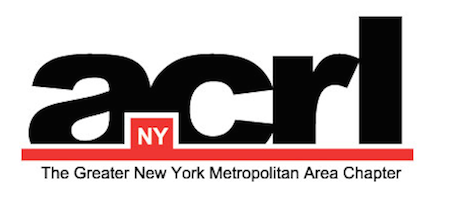By Dominique Bortmas, 2014 ACRL/NY Symposium Scholarship Recipient
This past December, I was fortunate enough to receive one of four scholarships for the ACRL/NY Symposium. As a current MLIS student and staff member of the Florida State University Libraries, I was excited to attend my first professional librarian conference. Based on my prior knowledge of ACRL/NY and past symposiums, I had high expectations for this experience. These high expectations were well surpassed upon attending the symposium. The speakers, discussion panels, and collaborative group work both excited and engaged me. My attendance at this event further prepared me with the skills and knowledge to promote open access for future libraries. I am already looking forward to attending next year!
Focusing on current trends and the future of academic librarians in open access, the symposium broadened my understanding of the open access movement. Before the symposium, I typically associated open access needs to STEM materials; however, after Brett Bobley’s presentation on open access within the humanities, I was able to see increased potential for academic librarians working outside of the STEM fields. Through his presentation, I was able to extend the application of open access to rare 3D materials that would be inaccessible for most scholars. Realizing that objects such as mummies could be digitized and made available for patrons was inspiring and motivating for me as a new librarian with a humanities background.
 My view of open access was further expanded by discussions about open access creators. Speakers Micah Vandegrift and Stephanie Davis-Kahl demonstrated ways for academic and scholarly communications librarians to involve students and professors in the open access movement. Returning to librarians’ fundamental responsibility of promoting easily accessible information, these speakers urged attendees to work with students to make information more usable through open data sets, tagging, and information literacy. This also extended to creating open access university digital repositories that shared student and faculty work, including university publications, dissertations, and even course projects. I was also reminded of the importance of liaison work. This was particularly reinforced in Micah Vandegrift’s stories of professors who lamented, “I have no idea what the library does for me”. For me, this was a strong reminder that our work as librarians extends beyond assisting students; we are also partially responsible for showing university faculty the many services we can offer to them for their own research and teaching.
My view of open access was further expanded by discussions about open access creators. Speakers Micah Vandegrift and Stephanie Davis-Kahl demonstrated ways for academic and scholarly communications librarians to involve students and professors in the open access movement. Returning to librarians’ fundamental responsibility of promoting easily accessible information, these speakers urged attendees to work with students to make information more usable through open data sets, tagging, and information literacy. This also extended to creating open access university digital repositories that shared student and faculty work, including university publications, dissertations, and even course projects. I was also reminded of the importance of liaison work. This was particularly reinforced in Micah Vandegrift’s stories of professors who lamented, “I have no idea what the library does for me”. For me, this was a strong reminder that our work as librarians extends beyond assisting students; we are also partially responsible for showing university faculty the many services we can offer to them for their own research and teaching.
Only two months have passed since the symposium, but I have already had the opportunity to apply much of what I learned to my current position as FSU’s Complex Cataloging Specialist and to my final MLIS semester. I enrolled in a course on Information and Open Access and am constantly considering how to apply new open access trends to my work in a major academic library. Currently, I am able to do this through my work with the electronic thesis and dissertations within the university digital repository. Moreover, my attendance at the symposium influenced my career path. I am currently pursuing a Scholarly Communications Librarian position at Florida State. Thanks to the information and experiences I gained from the ACRL/NY 2014 symposium, I feel prepared and even more motivated to promote an open access future.
Dominique Bortmas, a graduate of The Ohio State University, is currently in her final semester of Kent State University’s MLIS program. She is the Complex Cataloging Specialist at Florida State University. http://www.personal.kent.edu/~dbortma1/index.html
